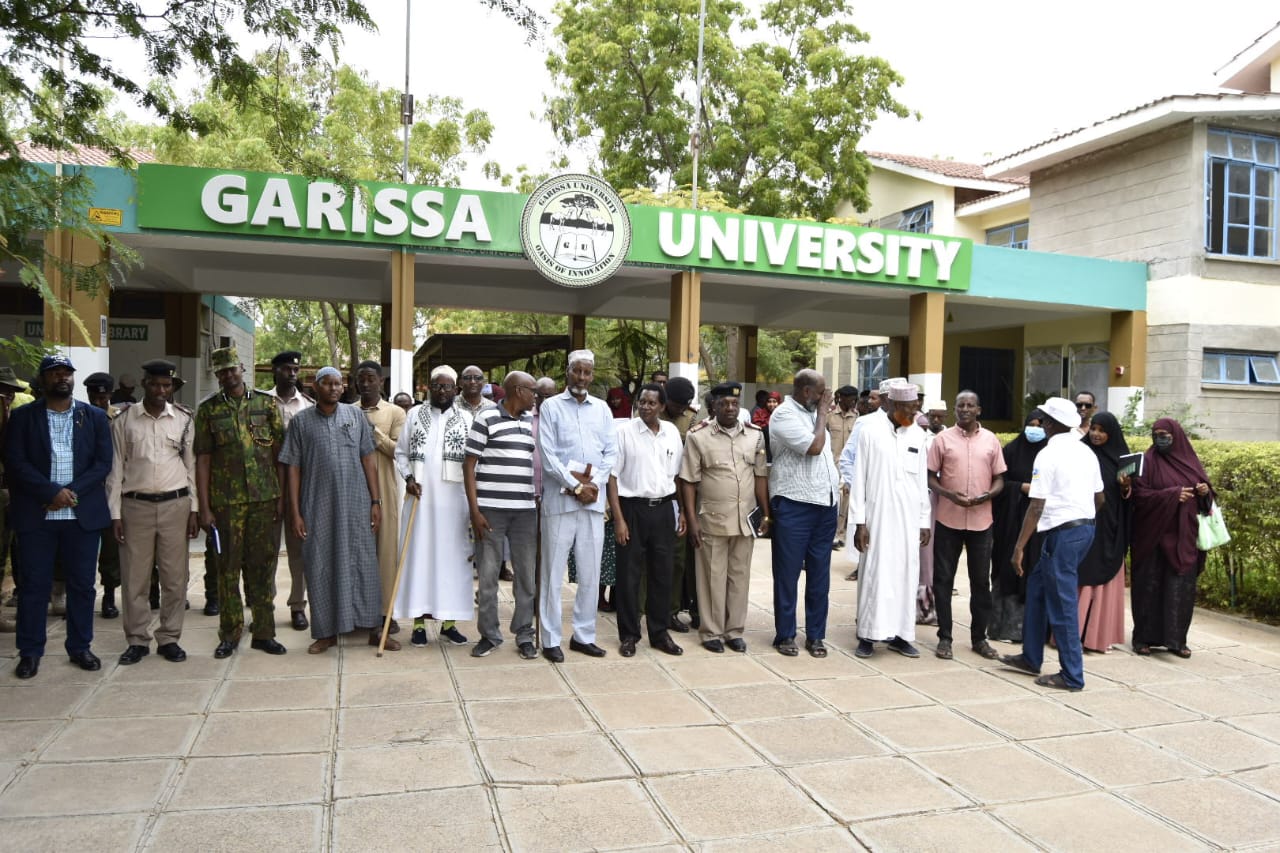 Security actors, officials from both National and county governments, community
and religious leaders, partners,
students and staff from Garissa University pose for group photo./STEPHEN ASTARIKO
Security actors, officials from both National and county governments, community
and religious leaders, partners,
students and staff from Garissa University pose for group photo./STEPHEN ASTARIKO  Mohamed Amin from Regional Pastoralists peace link./STEPHEN ASTARIKO
Mohamed Amin from Regional Pastoralists peace link./STEPHEN ASTARIKO  Sabastian Okiring, Garissa acting County Commissioner./STEPHEN ASTARIKO
Sabastian Okiring, Garissa acting County Commissioner./STEPHEN ASTARIKOGarissa University has launched a community policing initiative aimed at strengthening trust and collaboration between students, local communities, and security agencies — nearly a decade after the institution suffered Kenya’s deadliest terror attack.
Dubbed "Usalama ni Uaminifu" (Security is Trust), the initiative is supported by the Global Community Engagement and Resilience Fund (GCERF) and implemented locally by the African Child Development Organization (ACDO).
The programme aims to close critical security gaps through open and structured engagement among students, university staff, security actors, and local communities.
It is part of a broader effort to build long-term resilience and prevent a repeat of the 2015 Al-Shabaab attack that left 148 people — mostly students — dead.
Speaking at the launch on Friday, Mohamed Amin of the Regional Pastoralists Peace Link said the initiative will help create direct communication channels to ensure timely reporting and response to threats.
“The structured collaboration between students, university leadership, and security forces will promote proactive engagement in campus safety,” said Amin.
“Security is most effective when built on mutual trust and constant dialogue.”
Garissa County Acting Commissioner Sabastian Okiring echoed the importance of partnership in safeguarding institutions and communities.
“We are here today, first and foremost, to remember the 148 innocent souls we lost in 2015,” he said.
“At the time, the relationship between communities and law enforcement was very poor, which hindered information sharing. That gap cost lives.”
Okiring said since then, efforts to rebuild trust have paid off, noting that community confidence in security agencies has improved from 30% to 72%.
He praised ACDO and other partners for their continued support.
Iftin East Chief Dekow Mohamud emphasized that peace is the foundation of all progress, including education.
“We saw what happened when militants tried to shut down this institution,” said Mohamud.
“But through resilience and unity, we overcame. That’s what this initiative is about — sustaining that peace.”
Garissa University Vice Chancellor for Academic and Student Affairs, Prof Justus Mochami Gori, said the institution is still healing from the trauma of the attack and is committed to fostering a culture of security and preparedness.
“A joint relationship between students, community, and security actors is vital. If such a bond existed before 2015, perhaps we wouldn’t have lost 147 students,” he said.
Prof Gori also revealed the university’s plans to expand, with new campuses set to open in Wajir and Mandera counties.
Rashid Said, a master’s student in Peace, Security, and Conflict Management, welcomed the project as timely and necessary.
“Students can play a key role, not just through research, but by championing community participation in peacebuilding,” he said.
The launch also featured interactive sports activities, designed to break down barriers and build trust between students and security officers in a more informal setting.
The initiative marks a new chapter for Garissa University — one focused on healing, vigilance, and collective responsibility for peace.
















